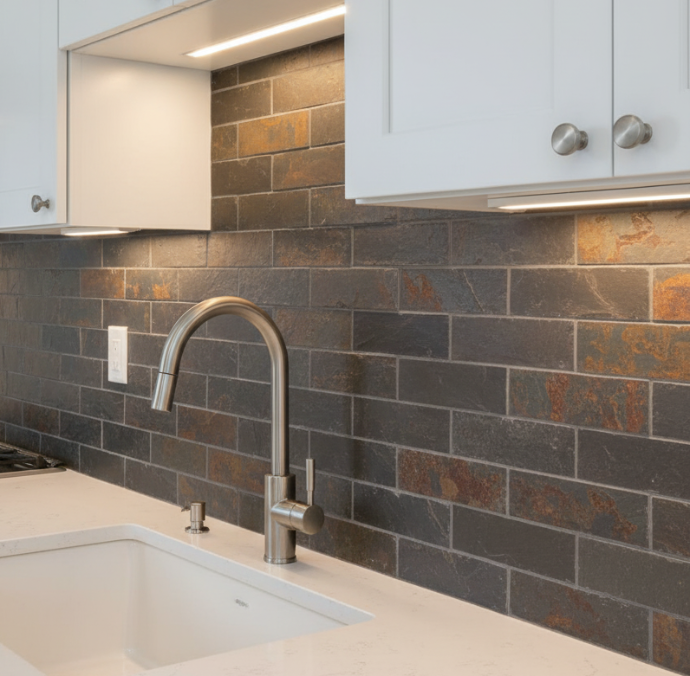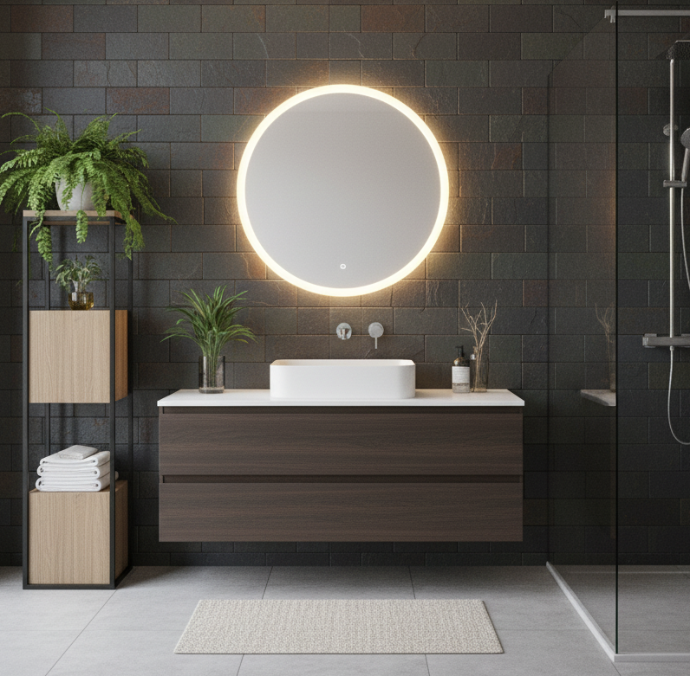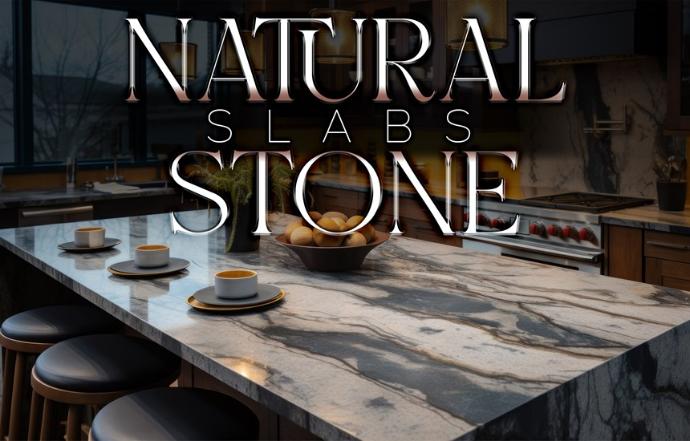Slate Subway Tiles
Natural
Beauty with Rustic Character
Slate
subway tiles are natural metamorphic stone tiles formed over millions of years,
featuring unique cleft surfaces with organic texture and color
variations
ranging from deep charcoal to warm earth tones. These tiles require regular
sealing to protect against moisture and staining, work best in kitchens,
bathrooms, and feature walls where rustic aesthetics are desired, and need
pH-neutral cleaners for maintenance due to their natural stone composition.
Slate subway tiles resist heat naturally, provide slip resistance through
textured surfaces, and can be installed in patterns including running bond,
herringbone, or vertical stacks, though installation requires thin-set mortar
formulated for natural stone and wider grout lines to accommodate irregular
edges.

Slate forms through metamorphic processes over millions of years, creating fine-grained stone with natural layering and texture. This geological formation gives the material its characteristic split surface and rich color depth. The stone's natural composition includes minerals that produce varied hues ranging from deep charcoal and slate gray to warm earth tones with copper or green undertones. Each tile displays unique patterns and color variations, ensuring no two installations look identical.
When selecting tiles for your project at Nova Tile and Stone, slate subway tiles deliver unmatched organic beauty. The cleft surface texture creates depth and dimension that smooth tiles cannot replicate. This natural texture catches light differently throughout the day, adding living quality to walls and surfaces. The rectangular subway format modernizes slate's traditional rustic appeal, bridging contemporary design with natural materials. Whether used for kitchen backsplashes or bathroom accent walls, the textured surface adds tactile interest alongside visual complexity.
These natural stone tiles demonstrate excellent durability in various applications. The dense stone resists heat, making it suitable for areas near cooking surfaces and fireplaces. Natural slip resistance from the textured surface provides practical benefits in wet areas. The stone's natural density helps it withstand daily wear while developing a subtle patina over time that enhances its character. Kitchen backsplashes, bathroom surrounds, and feature walls all benefit from slate's ability to maintain beauty in demanding environments.

Working with slate subway tiles requires attention to the material's natural properties. Thickness variations between tiles necessitate careful planning during installation to achieve even surfaces. Thin-set mortar formulated for natural stone ensures proper adhesion while accommodating slate's texture. Grout color selection significantly impacts the overall appearance, darker grout tones blend with slate's earthy palette, while contrasting lighter grout emphasizes the subway pattern. Spacing must account for the tiles' irregular edges, typically requiring slightly wider grout lines than manufactured tiles.
Maintaining these tiles involves regular sealing to preserve their appearance and protect against staining. Initial sealing after installation followed by periodic resealing maintains the stone's resistance to moisture and oils. Daily cleaning with pH-neutral stone cleaners prevents damage from harsh chemicals that can degrade sealant or etch the surface. Avoid acidic cleaners including vinegar-based products, as these can harm natural stone. The textured surface may retain dirt in crevices, requiring slightly more attention during cleaning than smooth alternatives.
At Nova Tile and Stone's tile collection, you'll find slate subway tiles that showcase nature's artistry while providing lasting performance. This natural stone option appeals to those valuing authentic materials with inherent character. For spaces where organic texture and earthy sophistication matter most, this tile choice creates environments that feel grounded and genuinely connected to natural elements.
While slate offers rustic texture and earthy character, homeowners seeking smoother natural stone options often consider travertine subway tiles for their refined elegance, or marble subway tiles for dramatic veining. Each natural stone brings distinct aesthetics to your space.
Frequently Asked Questions
How often do slate subway tiles need to be sealed?
Slate subway tiles require initial sealing immediately after installation, followed by periodic resealing to maintain protection against moisture and staining. The frequency depends on the tile's location and usage, high-traffic areas like kitchen backsplashes may need resealing every six months to one year, while less-exposed areas can go longer between treatments. Regular water testing helps determine when resealing is necessary: if water no longer beads on the surface, it's time to reseal.
Can slate subway tiles be used in shower surrounds?
Yes, slate subway tiles work well in shower surrounds when properly sealed and maintained. The natural slip resistance from their textured cleft surface provides safety benefits in wet environments. However, consistent maintenance is essential, regular sealing protects against water penetration, and using pH-neutral stone cleaners prevents damage to both the tile and sealant. Ensure proper waterproofing behind the tiles during installation for long-lasting performance.
What makes slate subway tiles different from porcelain or ceramic subway tiles?
Slate subway tiles are natural metamorphic stone formed over millions of years, while porcelain and ceramic tiles are manufactured products. Each slate tile displays unique color variations and texture that cannot be replicated, whereas manufactured tiles offer uniform appearance. Slate requires regular sealing and pH-neutral cleaners, while porcelain typically needs no sealing. Slate also has natural thickness variations requiring careful installation planning, unlike the consistent dimensions of manufactured tiles.
Why do slate subway tiles need wider grout lines than regular subway tiles?
Slate subway tiles have irregular edges due to their natural formation and hand-cutting process, unlike the precise, uniform edges of manufactured tiles. These natural variations in thickness and edge alignment require slightly wider grout lines to accommodate the inconsistencies and achieve even surfaces. Wider spacing also allows for proper grout coverage around the textured cleft surfaces, ensuring secure bonding and a professional finished appearance.
What grout color works best with slate subway tiles?
Grout color selection depends on your desired aesthetic. Darker grout tones in charcoal, gray, or black blend seamlessly with slate's earthy palette, creating a cohesive, natural appearance that minimizes visible grout lines and complements the stone's organic character. Contrasting lighter grout in cream or light gray emphasizes the subway pattern and creates a more graphic, grid-like effect. Consider that lighter grout may show dirt more easily given slate's textured surface, while darker tones offer better concealment of wear over time.

Natural stone Slabs
We import our slabs directly from the quarry to bring you the highest quality natural stone slabs you can get your hands on. Perfect for your next countertop, bathroom walls, or anything else you can think of.
- Quartzite
- Granite
- Marble
- Soapstone
- Dolomite
- Semi-precious stone

Engineered Slabs
Elevate your design aspirations to new heights with our exceptional range of engineered stone slabs. Whether you're looking for the durability of porcelain and sintered stone, or the the easy maintenance of quartz, we've got you covered.
- Quartz
- Porcelain
- Sintered Stone
- Cultured Marble
